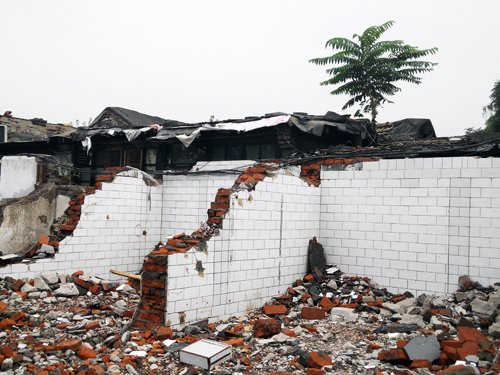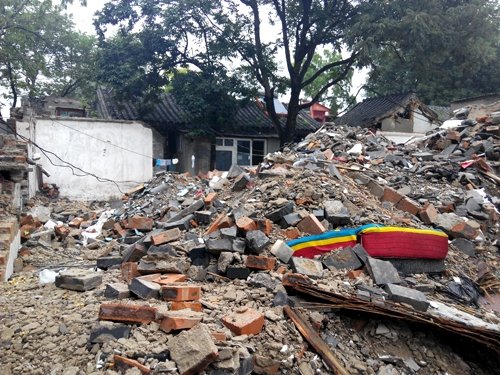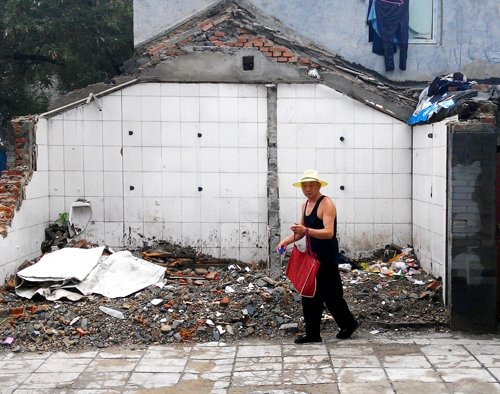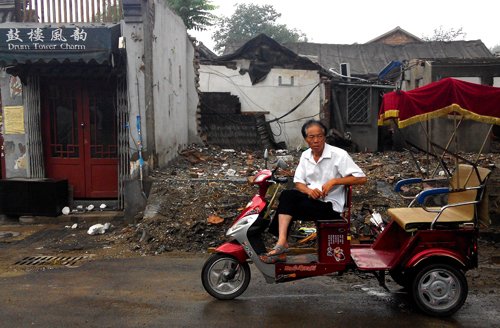Gulou Goodbyes: Beloved Drum and Bell Tower Area Razed
When I was assigned to take photos of the rubble around the Drum and Bell Towers, I had no idea what I was in for. Although I have been living around the Gulou area for three years, it had been some time since I had passed through the hutongs that snaked around the ancient structures. The last time I was there, it was lively. Queues of rickshaw drivers threatened to knock me off the path, badminton was everywhere, tourists flocked in and out of the countless cafes, bars, and shops.

This area was part of my favorite walking paths in Beijing just before sundown because, amazingly, it was the only place in the city I knew that could be buzzing, yet somehow, slow paced.

My fond memories don't have much weight against those of the residents who have spent years in this area and now have had their fears realized, witnessing their homes and restaurants get tacked with demolition notices.

I asked Dustin Duan of Excuse Coffee, who has taken over Zajia Cafe (which will thankfully remain untouched) during daytime hours, whether or not the lots would be used for an underground shopping mall, like what has been previously assumed and protested. Duan's shop has been torn down, unlike its neighbors, Au Goulot and Drum and Bell Bar, but he says it's only a matter of time. He says it's expected that the area will be transformed into a "courtyard" space, used primarily for offices, residences, and small restaurants and bars because that will ultimately be worth more money. It will be made to look "old", he says.

"They hope that 200 years from now, this area can look like an antique again," he says. "But they won't reveal exactly what it's going to be. They can't. If they did, people would fight it."

Wrecking was in progress as I wandered around, snapping what remained of the rubble. I wasn't the only one taking photos either. A few others had joined me, hoping to preserve what was left on their cameras. Residents who have been the last to leave stubbornly played mahjong outside their blocked off courtyard. Unknowing kids made the most of the unattended and overgrown lot.

Meanwhile, a lone rickshaw driver asked if people wanted tours of old Beijing.
Photos: Jessica Rapp
Related stories :
Comments
New comments are displayed first.Comments
![]() Paul
Submitted by Guest on Fri, 08/01/2014 - 03:41 Permalink
Paul
Submitted by Guest on Fri, 08/01/2014 - 03:41 Permalink
Re: Gulou Goodbyes: Beloved Drum and Bell Tower Area Razed
One thing's for sure, the more foreigners complain and campaign for preservation and against demolition, the faster the Chinese government will do it, we should campaign for razing them all and see what happens, I bet the policy would change overnight! haha
![]() mtnerror
Submitted by Guest on Thu, 07/31/2014 - 16:13 Permalink
mtnerror
Submitted by Guest on Thu, 07/31/2014 - 16:13 Permalink
Re: Gulou Goodbyes: Beloved Drum and Bell Tower Area Razed
As long as you don't try to paint the living quarters with a broad stroke I am fine. But when you describe the dwellings as 'there were "still people burning coal"' and "tiny" and "dark" and no wiggle room with statements like "Courtyards and hutongs are certainly not wheelchair friendly," it is 'certainly' does raise a wee flag. Of course some aren't, but some are! And could be much easier and more jovial to live in than the omnipresent 6-storey apartments with no elevators. And even the most modern of apartments with elevators commonly have obstacles at the base of the door frame which can make entering via wheelchair a big challenge or even impossible.
I've been to courtyards that were equal part modern amenities (electric garage doors, advanced water filtration, impressive lighting, etc.) and old Beijing charm. I've also seen ones in much need of repair, just like many apartment buildings around town. Who knows, maybe the owner or tenant is not as concerned with the utilities and appearnce of their abode as I am. How many times have you walked past a trash heap that is filled with the same trash day after day, week after week, month after month? (Not a heap that is removed every day or week, but one that sits there for days on end.) That's something I couldn't stand on my street or hutong and at some point in time, I would have to either call waste management and log a complaint (and perhaps levy a fine to the parties that be) or roll up my sleeves and take care of it myself (and maybe convince a few neighbors to help me). Or maybe repairs are delayed because they have an a**hole landlord or perhaps even they have their money in other things (such as a car, child's education, business, etc.).
Whenever one talks to "activists," no matter which side they're on, one's bound to get a certain sampling of info. I didn't say you were against historical preservation.
Did you have your own private WC or did you use the public toilet?
![]() Mojo-risin
Submitted by Guest on Thu, 07/31/2014 - 14:27 Permalink
Mojo-risin
Submitted by Guest on Thu, 07/31/2014 - 14:27 Permalink
Re: Gulou Goodbyes: Beloved Drum and Bell Tower Area Razed
mtnerror: I've been living in courtyards for six years now. I've seen people having to be picked up out of their wheelchairs and carried by hand back into their homes because the doorway was too narrow, or the doorway had that really annoying piece of wood running along the bottom, or because of other obstacles. I have seen disabled men who could make only the smallest of steps take over fifteen minutes to get to the public toilet. The man I'm thinking about I haven't seen in months, I expect he could no longer do it.
Moreoer, I'm not basing my opinion just on what I've seen and what I believe, I'm basing it on what my Chinese neighbors have told me. In fact, most of the residents I've met don't own, they rent. Why is that? Because the owners of the courtyards, including the one I live in, fled the Hutong life as fast as they could. I obviously enjoy the Hutong life as I've been living in one for six years. I'm also not arguing against historical preservation. What I said was I used to assume that my neighbors in Gulou felt the same way until I heard reports back from the meeting held six years ago. Perhaps it is you who is |putting your customs onto another."
Tommy: I'm not advocating the building of large tower blocks. However the courtyards are incredibly crowded. Many families live (and sometimes work) in just one small room. I don't see how you get around this problem without building up a few stories which is what a lot of people have done in the Hutongs which means that the courtyards of old are mostly long gone. I have a neighbor who has completely torn down her small courtyard and built a three story structure which she runs as a boarding house. It's completely illegal, ugly as sin, but not unusual. I have no idea how crowded the terraced cottages where in England or how many families lived in each one. But I doubt you had a situation like here where multiple families lived in a residence originally designed for one family. I cannot imagine the Chinese government can simply renovate and modernize the courtyards to alleviate these over-crowded conditions. Maybe it's just my cultural biases but I believe that most families living in a single room in a courtyard would prefer a more anonymous small apartment in a modest sized building. Perhaps even in a tower block.
![]() mtnerror
Submitted by Guest on Thu, 07/31/2014 - 10:42 Permalink
mtnerror
Submitted by Guest on Thu, 07/31/2014 - 10:42 Permalink
Re: Gulou Goodbyes: Beloved Drum and Bell Tower Area Razed
I highly doubt what is shown as rubble in the above pictures has been standing there for 200 years with its current building materials and exact form of centuries past. Renovations are made, even to hutongs, and hopefully what's coming next will be even more beautiful than what currently exists as a heap of rubble. They can be done shoddily and remain an an eye sore or they can be done tastefully and make for an added experience to the destination that is Gulou.
@mojo-risin: Where are you getting "as they age it's harder to live in a courtyard"? Courtyards can be retrofitted to accommodate the changing times. Have you seen how many elderly live in courtyards? And the retrofitting can be done nicely and implement some sense of aesthetics rather than always being done half-a** and serve no purpose other than utlity. It sounds a bit like you're putting your customs onto another and just can't fathom the idea of public toilets and communal living. People have been dropping diarrhea alongside their peeing brethren for millenia. If it's not something you feel comfortable doing, it doesn't mean people who have grown up in such an environment their whole life will feel the same way. And let's be fair, some of these buildings were not like other quality structures in Beijing (some also gorgeous to look at), not simply cultural capitals of the west. When there's money behind a construction project, the end product tends to be one that is easy to gaze upon and lasts a long time -- no matter the country.
![]() TommyUK123
Submitted by Guest on Thu, 07/31/2014 - 09:42 Permalink
TommyUK123
Submitted by Guest on Thu, 07/31/2014 - 09:42 Permalink
Re: Gulou Goodbyes: Beloved Drum and Bell Tower Area Razed
I'm with you on the general approach to the Hutong areas in Beijing. The vast majority of them are in real need of thorough redevelopment. But while they may have little architectural value, I think culturally and historically as a part of Beijing they do have tremendous value. I have no problem with working the area through and through to make it more livable, up to date and less slum like. How could anyone not be? But the problem in this country (and many others, actually) is that the authorities are so quick to just raze. Why raze when you can renovate?
Just look at the way the city tore down their city wall in favor of a ring road, it's a similar situation. There were many practical arguments for eliminating the city wall too, but does that make it certainly right? One could come up with practical arguments to remove virtually any structure or neighborhood in the world, and yet sometimes we draw lines. Why is that? Because sometimes an area or building has a value that can't be labelled in monetary terms.
You say that the locals would be glad to move in favor of a more modern living space. I don't doubt that, especially if the only option is move to modern accommodations or be homeless. I wonder though if there responses would all be the same if there was a renovate option instead of a "raze" one. I guess we'll never know now. Let me use an example from the UK, where in the post-war era, the government adopted a policy of building tower blocks to house people in so that they could "liberate" them from their horrendous terraced cottages that were built in the 19th century to house poor factory workers and miners. Those terraced houses had little to no plumbing, no electricity, and even by the 1950s most of them didn't have an inside toilet (each street had a toilet at the end of the row of houses). And so the demolition commenced and many of them said the same things you are saying "they'd prefer to live in more modern accommodation; we're improving their lives." In fact, the first thing to go after being shoved in a tower is the sense of community and, as you put it, "social interaction." Many of the tower block residents yearned to return to a terrace, where they would have neighbors, yards and pride in their homes. And so instead of tearing down more of these terraces, the local governments renovated them. They installed more modern plumbing, electrics, toilets, all the "mod cons" as it were. These houses were in no better state than the hutongs, but renovate was prioritized over raze and the result was much better.
Sorry to ramble, but while I do see all your practical arguments, and have even used them myself on this issue in the past. But having spent more time in Beijing, I now see the value of renovate over raze. That's how I feel it should have been handled.
![]() Mojo-risin
Submitted by Guest on Thu, 07/31/2014 - 07:43 Permalink
Mojo-risin
Submitted by Guest on Thu, 07/31/2014 - 07:43 Permalink
Re: Gulou Goodbyes: Beloved Drum and Bell Tower Area Razed
The author writes that her "fond memories don't have much weight against those of the residents who have spent years in this area and now have had their fears realized, witnessing their homes and restaurants get tacked with demolition notices." This implies that the majority of residents are against the demolition.
I lived in this area six years ago. Not only do many of the residents not have their own bathrooms, at that point, there were still people burning coal for heat which is incredibly toxic. There was talk back then about how the government would redevelop the area and the government then held a meeting in which no foreigners were allowed to attend. I knew someone who is sort of a local activist who went to the meeting. She told me that a substantial majority of the residents who attended wanted to be relocated to moved modern housing. That really surprised me at the time.
But as I spent more time in China and living in Hutongs I've realized why the residents would want to move. Not only are they living in tiny, overcrowded, often dark rooms with poor heating/ventillation, as they age it's harder to live in a courtyard. Courtyards and hutongs are certainly not wheelchair friendly and imagine being ill at night or having diareaha and not having you're own bathroom. The main benefit is probably the social interaction but the majority of the residents, if given the option, would prefer to live in a modern building with modern conveniences. It's often the foreigners, not the locals, who get upset about this kind of redevelopment.
In terms of the structures there is really nothing of architectural significance in most individual courtyards. The walls are made of stone and mud which then gets plastered over. The outside is gray brick. They've beeen getting rebuilt every fifty years or so for centuries so the "original" structure doesn't exist. Most courtyards no longer even have an actual courtyard because they've been filled in with other structures. These buildings are not like older buildings in cities like London, New York or Paris. There is no beautiful craftsmenship that would be hard to replicate. They're just simple brick structures that are often even not that old.
Sorry to sound cynical but I think that's the reality of the situation.
Validate your mobile phone number to post comments.










